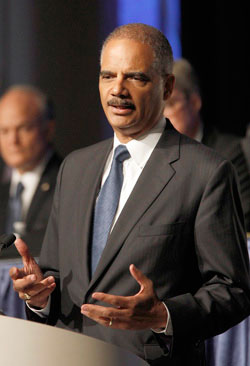Attorney general's speech reflects ABA push against overcriminalization

Photo of U.S. Attorney General Eric Holder by Tony Avelar.
When U.S. Attorney General Eric Holder told the ABA’s 560-member House of Delegates about his sweeping initiative that in effect renounced decades of tough-on-crime anti-drug legislation and policies, it fell on welcoming ears. For years, the ABA has been calling for these and other reforms to criminal laws.
“The attorney general’s announcement is a welcome and much-needed response to serious problems of overcriminalization and overincarceration,” says Neal Sonnett, past chair of the ABA Criminal Justice Section.
Significant among the initiatives Holder outlined was a change in Department of Justice policies for dealing with low-level, nonviolent drug offenders—with an eye to ending overincarceration and its counterproductive effects on society—largely because of mandatory minimum sentences.
“Too many Americans go to too many prisons for far too long and for no truly good law enforcement reason,” Holder said, receiving applause.
Holder’s high-profile announcement in August added extra buzz to the House of Delegates’ opening session at the ABA Annual Meeting in San Francisco.
The new Smart on Crime program will encourage U.S. attorneys to charge defendants only with crimes “for which the accompanying sentences are better suited to their individual conduct, rather than excessive prison terms more appropriate for violent criminals or drug kingpins,” Holder said.
He has told U.S. attorneys to “develop specific, locally tailored guidelines—consistent with our national priorities—for determining when federal charges should be filed, and when they should not.”
The Smart on Crime effort is limited to the DOJ’s policy parameters. Holder said President Barack Obama is asking Congress to pass legislation to give federal judges greater discretion with mandatory minimum sentencing for some drug offenses, among other proposals.
Holder said that Sens. Dick Durbin, D-Ill., Mike Lee, R-Utah, Patrick Leahy, D-Vt., and Rand Paul, R-Ky., are supporting such efforts. Those efforts include the proposed Smarter Sentencing Act of 2013, which would lower several drug-crime mandatory minimum sentences, as well as give federal judges leeway to give sentences that are less than called for under sentencing guidelines.
WELCOME STEPS
In recent years the DOJ telegraphed the possibility of Holder’s bold move. In February 2012, for example, Associate Deputy Attorney General Matthew Axelrod, in testimony before the U.S. Sentencing Commission, said “we are now on a funding trajectory that will result in more federal money spent on imprisonment and less on police, investigators, prosecutors, re-entry and crime prevention,” adding that “in these budget times, maximizing public safety can only be achieved if we control prison spending.”
The DOJ’s new initiative includes not just lowering the financial burden of imprisonment, but better-funded and -focused efforts at law enforcement, as well as programs for treatment and rehabilitation of low-level, nonviolent offenders.
Holder said that in 2010, $80 billion went toward incarceration, and that prisons are filled 40 percent beyond capacity. Mandatory minimum sentences are partly responsible for those costs and numbers.
Also in 2010 a group of prominent conservatives with tough-on-crime bona fides signed on to a statement of principles supporting reforms in sentencing and incarceration policies. “We have learned a lot since the widespread enactment of draconian, one-size-fits-all mandatory minimum sentencing laws in the 1980s,” said outgoing ABA President Laurel G. Bellows in response to Holder’s announcement. “The level of incarceration and the fiscal and human costs under current federal policies are unsustainable. Already, the growth in the budget for the Federal Bureau of Prisons is crowding out and resulting in the elimination of vital law enforcement programs. These changes outlined by Attorney General Holder today are welcome and much-needed steps toward bringing the federal system into line with smart, evidence-based policy that will better serve taxpayers and public safety.”



